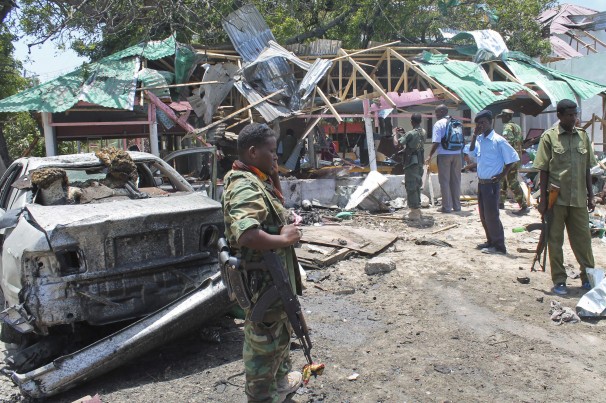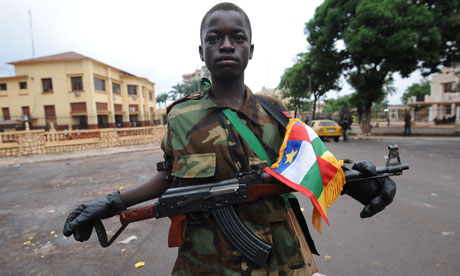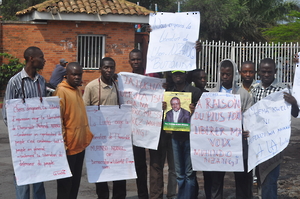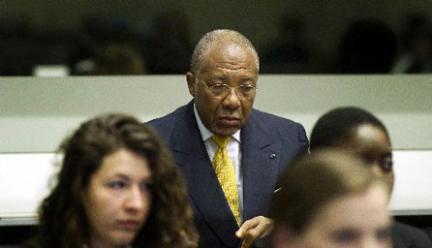By: Danielle L. Gwozdz
Impunity Watch News Reporter, Africa
MOGADISHU, Somalia – The Somali Islamist militant group, al-Shabab, bombed a local restaurant in the capital, Mogadishu, killing 15 people and wounding 23. Al-Shabab set off a car bomb and a suicide bomber in the crowded restaurant on Saturday.

The car bomb went off first outside the popular restaurant and then a suicide bomber blew himself up inside the restaurant immediately after the car bomb, Mohamed Yusuf, a spokesman for the Mogadishu authorities, told Reuters.
According to news reports, the explosions ripped off most of the restaurant’s roof. The restaurant is a popular spot for government employees, journalists, and students, and is located about a half mile from the presidential palace and National Theatre.
“They attack the restaurants because they hate to see people peacefully spending time together,” Mohamed Abdi, an Interior Ministry employee at the scene of the attack, told the Associated Press. “They are committed to obliterating any sign of peace. Because of such attacks, it’s very hard for the government to restore security in the near future.”
This wasn’t the first time this restaurant has been bombed. In September 2012, the restaurant was targeted by two suicide bombers that killed 14 people.
The restaurant is run by Somali businessman Ahmed Jama, who returned to the country in 2008 from the U.K. Mr. Jama told BBC News that “I won’t let this stop me. I will start the clean-up tomorrow.”
“My decision was to do something and as long as I live, I will continue – I’m a business guy with restaurants and I’m going to continue with that,” Mr. Jama told BBC.
Somalia’s al-Qaeda linked al-Shabab militia claimed responsibility for the attacks. It has continued to wage a deadly insurgency even after being pushed out of Mogadishu in 2011.
“Government officials, military forces, workers and their security always meet here,” an al-Shabab spokesman, Sheikh Abdiasis Abu Musab, told Reuters. “We had targeted it even before today, and we shall continue targeting it.”
Al-Shabab’s Somali-language Twitter feed read: “Successful operations carried out in Hamarweyne,” referring to the Mogadishu district where the attacks occurred. Al-Shabab’s Engligh-language Twitter account has been suspended.
Al-Shabab also claims to have killed “key officials” on its Twitter feed; although witnesses told Yahoo! that the casualties looked like ordinary civilians.
The UN secretary-general’s special envoy to Somalia, Nicholas Kay, said: “I am appalled by this act of savagery and condemn it in the strongest terms.”
“I offer my sincere condolences to the families and friends of those killed and wish a speedy recovery to the injured.”
Since the overthrow of President Siad Barre in 1991, Somalia has seen clan-based warlords, Islamist militants, and its neighbors all battling for control.
“The terrorist elements used to claim they target Somali government (officials) but such an attack is proof they have no sympathy for anyone, they kill innocent civilians at restaurants,” Somali President Hassan Sheikh Mohamud told a press conference.
Shebab fighters, who have claimed responsibility for a string of recent attacks aimed at overthrowing the government, remain a potent force.
For further information, please visit:
BBC News – Somalia’s Al-Shabab says it bombed Mogadishu eatery – 7 September 2013
Reuters – Al Shabaab bombers strike Mogadishu restaurant, 15 dead – 8 September 2013
The Washington Post – Somali militants kill 15 in bombing at popular Mogadishu restaurant – 7 September 2013
Standard Media – At least 15 killed after blasts hit restaurant in Mogadishu, Somalia – 7 September 2013
The Peninsula – Twin blasts kill 18 in Somali capital – 8 September 2013
Yahoo! News – Shebab claim twin blasts in Somali capital that kill 18 – 7 September 2013



